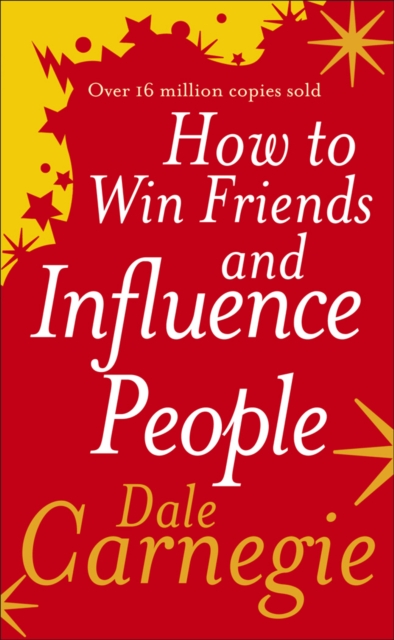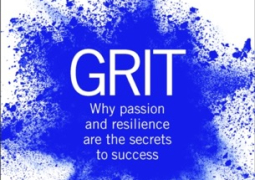
How to Win Friends and Influence People is a self-help book written by Dale Carnegie, published in 1936. Over 30 million copies have been sold worldwide, making it one of the best-selling books of all time. In 2011, it was number 19 on Time Magazine's list of the 100 most influential books.
Before Dale Carnegie wrote this book he founded his own school, the Dale Carnegie Center for Excellence, in 1912. With the book’s success the school expanded; it now has branches in ninety countries and in all fifty states, and offers courses like “Confident, Assertive, and in Charge,” “How to Communicate with Diplomacy and Tact,” and “How to Win Friends and Influence (Business) People.” Warren Buffett, the billionaire and investment banker, attended the school and credits it for his success. “In my office, you will not see the degree I have from the University of Nebraska, or the master’s degree I have from Columbia University, but you’ll see the certificate I got from the Dale Carnegie course,” Buffett told a documentary film crew. The courses usually cost fifteen hundred dollars or more, but the schools regularly host free sessions for prospective students. On a recent Monday evening, I decided to go to one.
The Manhattan branch of the Dale Carnegie Institute is housed in a basement of an Upper East Side high-rise. When I arrived, two women in dark suits cheerfully handed me a name tag. Names were important to Dale Carnegie; several of the success stories in his book are about people with a gift for remembering them. Carnegie was certain that if you repeated someone’s name, a lot, they would invariably begin to like you; that a name said repeatedly was like a love spell. “Remember that a person’s name is to that person the sweetest and most important sound in any language,” he wrote.
I was directed to Classroom B, a windowless room with worn gray carpeting. There were twenty or so students sitting on folding chairs, white name tags adhered to their button-down shirts, obedient and eager.
I had read “How to Win Friends and Influence People” for the first time a few weeks prior, and had struggled to finish it. Carnegie’s thinking is as predictable as that of a golden retriever who leaves a tennis ball at your feet. His great epiphany is that when you are nice to people they are more likely to be nice back. My kindergarten teacher had covered similar ground.
Most of the other students were men, and most of them wore suits. Many had come with colleagues, forming corporate cliques. There was a crew from Citibank, one from Chase, and one from the drugstore Duane Reade. They all seemed to have read Carnegie’s book. Not everyone had found it revelatory, but they blamed the medium rather than Carnegie’s methodology: they thought a class might be a better way to absorb his ideas—after all, school had been Carnegie’s original method of evangelism. One of the men sitting near me worked in the accounting department at the bank HSBC. He explained that his cubicle neighbors worked in different departments and he had little reason to speak with them. He’d become so accustomed to communicating by e-mail or chat that he felt he needed a refresher in basic conversation skills.
The man sitting next to me had shaggy hair and a friendly face. He was a musician, a singer-songwriter, who supported himself as a real-estate broker. He’d been losing clients over the past few years. He’d found that people preferred browsing listings online for free to interacting with an agent for money. He had been trying to plan his next career move and came across an online flyer for a free Dale Carnegie class. “Free,” he repeated, as though it explained everything. He had always worked for himself. “I never thought of myself as a natural leader,” he told me. “It’s kind of amazing that you can just learn to be one.”
Our instructor was a middle-aged woman in a dark pants suit with a sturdy, windproof bob. She congratulated us for being there. “Everyone here works for a company, or wants to work for a company,” she said. Everyone’s name tag listed an employer. (Mine read, “Book.”)
The Carnegie school assumes that everyone aspires to work at a corporation with clear hierarchies and ladders to climb. The flyer that the musician/realtor found online had said that the class was intended for “employees at all levels in a corporation who seek to maximize their performance, become stronger leaders, and add more value to the organization.” The class, and Carnegie’s book, are designed for a particular kind of striver, one struggling to get noticed by higher-ups. They are intended, in other words, for a kind of workplace, and worker, that may not exist for much longer. But, when Carnegie began peddling his particular brand of optimism during the Great Depression, a stable corporate job was the ultimate dream, and his readers were willing to sacrifice anything for it.
Carnegie was born Dale Carnegey in 1888 in Maryville, a small town in northwest Missouri. His parents were farmers, and it was his job to milk the cows each morning before school. The Carnegeys grew their own fruits and vegetables, butchered and smoked their own pigs, and traded their eggs and milk for coffee and sugar. They scraped by, barely. Dale hated farmwork and spent his childhood trying to finagle his way out of it. “Above all else, I hated to chop wood,” he wrote, according to his biographer Steven Watts. “I despised it so bitterly that we would never have any firewood stored up in advance.”
When he was sixteen, the family moved to Warrensburg, in southeast Missouri, where there was a free university. Dale enrolled as soon as his family arrived in town; he planned to become a teacher one day. During his first year, he had a massive growth spurt and outgrew all of his clothes, and his parents didn’t have the money to buy him new ones. He looked ridiculous with his long limbs and broad, half-moon ears. Girls ignored him; they tended to go for the athletes—the confident, brawny types. But Dale noticed that the school’s top debaters, even the scrawny ones, had decent luck with women. With nothing to lose, he joined one of the school’s literary fraternities, which hosted public-speaking tournaments on campus.
He bombed his first competition. “I was so crushed, so beaten, so despondent, that I literally thought of suicide!” he recalled, years later. “Sounds silly? Not when you are seventeen or eighteen and suffering from an inferiority complex!”
He practiced obsessively. He’d recite famous speeches as he milked the cows and rode his horse to school. It paid off: in his third year of college, he won the school’s debate championship. He was elected student-body vice president and was invited to deliver sermons at churches around Warrensburg. He even got his first girlfriend.
His mother hoped that he’d become a missionary or a preacher. But instead, Dale became a salesman—he didn’t want to be poor, like his parents. He travelled across the Midwest, selling home-education courses to ranchers. He had a knack for sales and soon moved on to more lucrative wares, like bacon, soap, and lard.
By twenty-three, he’d saved enough money to move to New York and enroll in drama school. He didn’t want to be an actor, per se, but he thought he could be a public speaker, reciting stories and poems before crowds. His dream was to join the Chautauqua lecture circuit, an ensemble road show of public intellectuals and storytellers who performed in makeshift tents across America. Their most coveted speaker was William Jennings Bryan, a two-time candidate for president; crowds were wild for his essay on temperance. It was a potentially lucrative career, but Dale’s family didn’t approve. His mother believed that only heathens performed on stage. “It is far nobler work than selling meat,” he assured her.
In 1911, he enrolled in the American Academy of Dramatic Arts, considered one of the most prestigious theatre schools in the country, where he learned, among other things, how to imitate a chair. He tried out for various theatre productions but could never land a part. He began teaching public-speaking classes at the Y.M.C.A. so he could stay solvent until his theatre career took off. He developed a reputation as a masterful teacher, and the classes took up more and more of his time. Thousands of students signed up to take his “Effective Speaking and Human Relations” class. He helped salesmen perfect their pitch and businessmen steady their nerves before a big presentation; he taught his students how to summon courage when they were nervous and feign confidence when they were sick with terror. He was heralded as a magician, one who could turn an awkward loaf into a charmer, or coach a wallflower into the spotlight. He became an expert on communication and management, even though he’d never been a manager. He had spent his career gigging, cobbling together an income between teaching, lecturing, and writing: he had no knowledge of what it was like to commute to the same office to do the same job day after day and year after year. And yet, he became a world-renowned expert in achieving corporate success.
In 1915, Dale collected his lectures and notes into a book: “Public Speaking: A Practical Course for Businessmen.” Later that year, he registered for the draft, but he was ineligible for active duty because he was missing the top of his left index finger, from an accident as a child, and he was assigned to an administrative post at a Long Island military base. After the war, he accepted a job as a business manager for a theatre troupe. While on tour through Europe, he met Lolita Baucaire, a German actress. They married in 1921, and settled in Paris, where they lived on the royalties for his first book, and Dale worked on a novel that he never published. (They divorced in 1931.) When he returned to New York in 1926, to resume his public-speaking classes, he changed his last name to Carnegie. He thought the new spelling made his name easier to remember. (By then, he’d already developed his theory about the importance of names.) An editor from Simon & Schuster encouraged him to write a book about “the art of getting along with people” that would include a collection of his public-speaking lessons, as well as new materials. It was Carnegie who came up with the book’s title: “How to Win Friends and Influence People.”
When “How to Win Friends and Influence People” was published, in 1936, unemployment in America was at 16.9 per cent. It was the tail end of the Great Depression, and virtually no one was hiring. Those with jobs were frantic to hold onto them, and Carnegie’s book included some sound advice for those trying not to get fired. Among its first lessons, for instance, is don’t “criticize, condemn, or complain.” Carnegie offers six rules for getting people to like you, and they all encourage flattery and pleasantries. Rule #1: “Become genuinely interested in other people.” Rule #2: “Smile!” He has twelve additional rules for “winning people to your way of thinking.” Rule #1: “The only way to get the best of an argument is to avoid it.” Rule #7: “Let the other person feel that the idea is his or hers.” Carnegie advised that people aspire to be—to borrow Chesterfield’s favorite adjective—“easy”; that they learn to blend in.
Carnegie’s book is a compendium of case studies of great men and their achievements, men like Benjamin Franklin, Abraham Lincoln, and Lloyd George, Great Britain’s Prime Minister during the First World War. He writes that true leaders tread softly. They ask questions and never bark orders; they heap praise upon their employees and never dwell on their mistakes; they are self-effacing and encouraging and never imperious or cruel. They are authoritative but gentle. His book argues that kindness, often considered a liability in the workplace, is actually an asset. Carnegie had found that men were socialized to think that being brutish and loud was the only way to demonstrate readiness for power. Offices functioned like one perpetual rush session, like laboratories of aggressive showmanship. He argues, instead, that politeness is the most effective tactic for getting ahead. “Why, I wonder, don’t we use the same common sense when trying to change people that we use when trying to change dogs?” he writes. “Why don’t we use praise instead of condemnation?”
While Carnegie writes about great men, his book is largely intended for their employees. And although Carnegie’s advice was applicable to the fearful workers of the Great Depression, the book does not read as if it was written during a difficult or dire moment. It is a happy book. “Dale Carnegie sells people what most of them desperately need,” the Saturday Evening Post declared in a 1937 profile. “He sells them hope.” Much of that can be attributed to Carnegie’s zippy prose. (“Skeptical? Well, I like skeptical people.”) He offers no prognosis of the economy, no dour, grandfatherly reminders about it being “hard out there.” He seems to have no awareness of how hard it really was.
Carnegie was not the first person to evangelize about the power of optimism. In the mid-eighteen-hundreds, a group of psychologists, philosophers, and religious leaders formed what they called the school of New Thought. They believed in the power of “mind-cures,” in the efficacy of determination and grit. The psychologist William James, who popularized the ideas of the New Thought movement, wrote of the “all-saving power of healthy-minded attitudes.” He argued that if you mustered your mental powers and stayed focussed, you could achieve anything—wealth, social success, popularity. Positivity could even heal a cold.
Carnegie often cites James in his books and lessons. “You don’t feel like smiling?” he writes. “Then what? Two things. First, force yourself to smile. If you are alone, force yourself to whistle or hum a tune or sing. Act as if you were already happy, and that will tend to make you happy.” He is citing one of James’s theories that our facial expressions determine our mood as well as indicate it. Carnegie believed that our actions dictate our thoughts, that we can train ourselves to be happy, smart, and productive by behaving as if we are. If managers treated their employees as if they were competent, they would become competent. If employees treated their managers as if they were wise and compassionate, they would stop behaving like tyrants. All anyone wants, Carnegie writes, is to feel appreciated. If you’re generous with your perceptions of others, you can have all the friends and influence in the world.
The cult of positive thinking has outlived Carnegie. The most prominent example is probably “The Secret,” Rhonda Byrne’s self-help philosophy, which claims that one can will an outcome into existence simply by wanting it badly enough. “The Benefits of Optimism Are Real,” read a recent headline for an Atlantic article that summarized the latest psychological research on positive thinking. Ruminating and venting, the article finds, have no tangible benefits, but cheerful resilience pays dividends.
There is, however, another school of behavioral psychology, which believes too much optimism makes you soft. It can zap your motivation—if you’re certain that life will turn out as you hope, then you don’t have the same hunger to try. Gabriele Oettingen, a psychologist at New York University, studied a group of women enrolled in a weight-reduction program and found that it was the pessimists who lost the most weight. “Dreaming about the future calms you down . . . but it also can drain you of the energy you need to take action in pursuit of your goals,” Oettingen concluded.
Many have questioned Carnegie’s theory about the necessity of kindness in the workplace. Today’s business advice catering to women, for instance, is essentially reverse-Carnegie. “Be a good listener,” he advises. “Encourage others to talk about themselves.” But studies today show that men interrupt their female colleagues with far greater frequency than their female colleagues interrupt them, and Sheryl Sandberg and other ambassadors of female ambition urge women who want to climb the corporate ladder to speak up. Likewise, Carnegie encouraged his readers to be perpetually deferential: “The unvarnished truth is that almost all the people you meet feel themselves superior to you in some way, and a sure way to their hearts is to let them realize in some subtle way that you recognize their importance.” Yet Sandberg, among others, advises women to develop their confidence and guard themselves from men who take credit for their ideas.
There are other ways in which Carnegie’s advice seems outdated. By the year 2020, forty per cent of American workers will be freelancers, according to a study conducted by the software company Intuit. That means they’ll make their income much as Carnegie himself did, cobbling together gigs from different clients and projects. Corporate loyalty is more fleeting today than it was in Carnegie’s day. There’s been a shift to individual “brands,” with employees, at all ranks, trying to create a distinct identity online. In this new era of heightened individualism, corporations have had to offer new perks and toys—gourmet food, expensive coffee—to instill company camaraderie.
But most companies don’t make such efforts, and most businesses aren’t trying to retain their workforce. “Fifty years ago, when you went to business school, you were taught that you want a loyal, dedicated, skilled workforce,” Nelson Lichtenstein, director of the Center for the Study of Work, Labor, and Democracy at U.C. Santa Barbara, told the Los Angeles Times. “Today, if you go to business school, they tell you [you] don’t want a permanent workforce. That’s considered new standard operating procedure.”
Carnegie treated the employee-employer relationship as a sacred, symbiotic bond. In today’s economy, work is structured more like a string of one-night stands.
On the other hand, Carnegie’s ideas about the importance of emotional intelligence and positivity are, perhaps, more apt than ever for the uncertainties of the modern freelance market. Jobs are changing; careers that don’t exist today will be in demand a decade from now. The modern worker of the post-Fordist era has to be easy to work with and open to change. Some years ago, I wrote an article about ex-convicts trying to start their own businesses and turn their lives around. There were seven subjects in total, and each had read “How to Win Friends and Influence People” upon getting out of prison. One of the men, who had served twenty years for a jewelry heist and read a lot of self-help, told me that Carnegie’s book was the only thing he’d found that made it seem possible to start over.
In the class at the Dale Carnegie Institute, we memorized each other’s names and practiced enunciating our own. We learned an elaborate “visual mnemonic” to help us memorize Carnegie’s principles for success. I forgot it within seconds. Our instructor peppered her lecture with moralistic maxims like, “You have two ears and one mouth for a reason.” For the last exercise of the night, we wrote down our goals and shared them with a partner. The realtor/musician wanted to record more songs. I wanted to finish my book and do more overseas reporting. Then we had to make a list of everything we were going to change about ourselves to accomplish those goals. That was the real goal. We could all be more industrious, more tenacious, more direct. All we had to do was try.
Available at Timbooktoo tel 4494345




